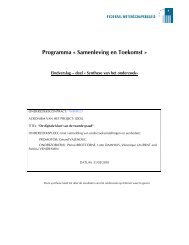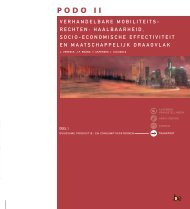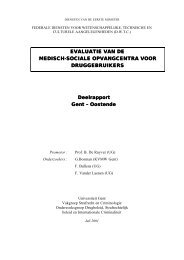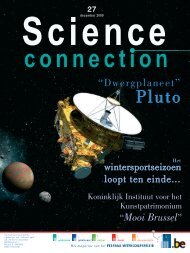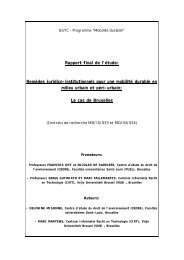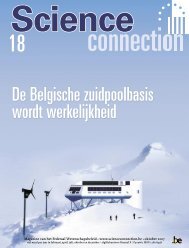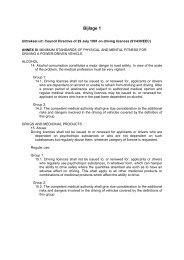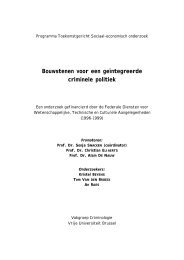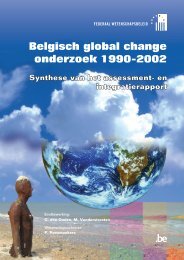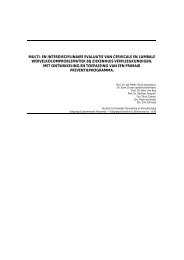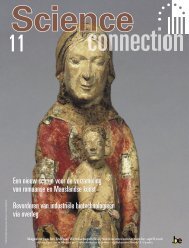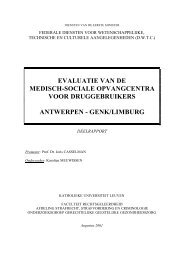chapter 3 inventory of local food systems
chapter 3 inventory of local food systems
chapter 3 inventory of local food systems
You also want an ePaper? Increase the reach of your titles
YUMPU automatically turns print PDFs into web optimized ePapers that Google loves.
Project CP/59 - “Instruments and institutions to develop <strong>local</strong> <strong>food</strong> <strong>systems</strong>”<br />
instruments and the lack <strong>of</strong> statistical data. In addition, following the advice <strong>of</strong> the<br />
accompanying committee, we refocused our attention to the social dimension <strong>of</strong> <strong>local</strong><br />
<strong>food</strong> <strong>systems</strong>, as these were argued to be the most important asset <strong>of</strong> <strong>local</strong> <strong>food</strong> <strong>systems</strong>.<br />
However, the social dimension turned out to be even more difficult to grasp as it is not<br />
well developed in the literature.<br />
Future research should focus more on the consumer as object <strong>of</strong> investigation. It is still<br />
unclear to what arguments consumers are prone to listen to. Our research suggests that<br />
for the social, economic and ecological dimensions, differences in performance<br />
between LFS and MFS are less related to the system itself, but more to the attitude and<br />
behaviour <strong>of</strong> various actors and the exploitation <strong>of</strong> scale efficiency in for example<br />
cooling and transportation. As a result, LFS and MFS can learn from each other.<br />
We intensively studied three cases studies <strong>of</strong> LFS to find out what are the leverage points<br />
in their development. We distinguished between interior and exterior factors. We<br />
propose that managerial ability, reflection and trust are key elements and competences<br />
necessary for success in collaboration. When one element is absent or incomplete, the<br />
probability <strong>of</strong> survival or growth is small. These competences can be developed, a task<br />
for farmers organisations and government. However, so far most competences addressed<br />
by most programmes are <strong>of</strong> a rather technical nature only (e.g., bookkeeping,<br />
marketing).<br />
A supporting R&D system, more flexible government regulations and broader networks<br />
are important external conditions for LFS to develop. Room for experimentation should<br />
be created to foster radical innovations also in the social or organisational realm. Our<br />
concluding workshop provided additional pro<strong>of</strong> <strong>of</strong> how difficult it is to open-up the<br />
thinking <strong>of</strong> a relatively closed group <strong>of</strong> people that actually sees itself as being quite<br />
open-minded.<br />
Future research should focus more on the learning ‘disabilities’ and system<br />
imperfections that hinder the further development <strong>of</strong> LFS. Success stories <strong>of</strong> cases that<br />
were able to counter these disabilities and imperfections can lead to improved advice<br />
and policies.<br />
5.4. Presentations and papers<br />
Coene, H., Van Hauwermeiren, A., Claes, C., Mathijs, E., The modalities <strong>of</strong> social<br />
networks in rural areas within Belgium, Contributed paper, XXIth Congress European<br />
Society for Rural Sociology, Keszthely, Hungary, 22-27 August 2005.<br />
Van Hauwermeiren, A., Coene, H., Claes, C., Mathijs, E., Food and energy life cycle<br />
inputs: a comparison <strong>of</strong> <strong>local</strong> versus conventional <strong>food</strong> <strong>systems</strong>, Contributed paper, 11th<br />
Annual International Sustainable Development Research Conference, June 6-8, 2005,<br />
Finlandia Hall, Helsinki.<br />
Van Hauwermeiren, A., Coene, H., Claes, C., Mathijs, E., Life cycle analysis and the<br />
choices in purchasing patterns, Paper presented at the Fruit and Vegetable Seminar.<br />
SPSD II - Part I - Sustainable production and consumption patterns - Agro-Food 74



